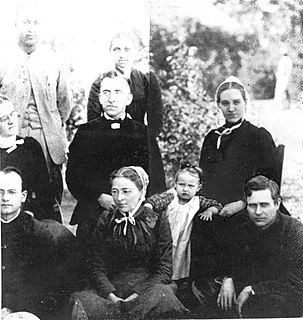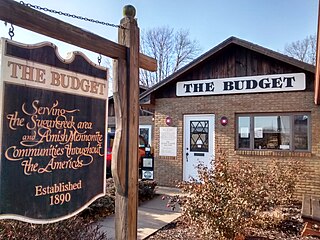Related Research Articles

The Mennonites are members of certain Christian groups belonging to the church communities of Anabaptist denominations named after Menno Simons (1496–1561) of Friesland. Through his writings, Simons articulated and formalized the teachings of earlier Swiss founders, with the early teachings of the Mennonites founded on the belief in both the mission and ministry of Jesus, which the original Anabaptist followers held with great conviction, despite persecution by various Roman Catholic and Protestant states. An early set of Mennonite beliefs was codified in the Dordrecht Confession of Faith in 1632, but the various groups do not hold to a common confession or creed.

Jakob Ammann was an Anabaptist leader and namesake of the Amish religious movement.

The Schleitheim Confession was the most representative statement of Anabaptist principles, by a group of Swiss Anabaptists in 1527 in Schleitheim, Switzerland.

Plain people are Christian groups characterized by separation from the world and by simple living, including plain dressing in modest clothing. Many Plain people have an Anabaptist background. These denominations are largely of German, Swiss German, Dutch or other European ancestry. Conservative Friends are traditional Quakers who are also considered plain people; they come from a variety of different ethnic backgrounds.
The Conservative Mennonite Conference (CMC) is a Christian body of Conservative Mennonite churches in the Anabaptist tradition. They are mostly of Amish descent.
Moses M Beachy was the founding bishop of the Beachy Amish Mennonite churches in 1927 and a former bishop in the Old Order Amish churches.
Weavertown Amish Mennonite Church is a Beachy Amish Mennonite congregation located in the village of Weavertown, between the somewhat larger villages of Bird-in-Hand and Intercourse in Lancaster County, Pennsylvania, United States.

Amish Mennonites came into existence through reform movements among North-American Amish mainly between 1862 and 1878. These Amish moved away from the old Amish traditions and drew near to the Mennonites, becoming Mennonites of Amish origin. Over the decades, most Amish Mennonites groups removed the word "Amish" from the name of their congregations or merged with Mennonite groups.
Located in Smithville, Ohio, Oak Grove Mennonite Church is an historical church that has made a significant contribution to the larger Mennonite denomination. Currently pastored by Doug Zehr. Oak Grove started as an Amish church in 1818, as many Amish started settling in Wayne County, Ohio. From humble beginnings the church grew and built a meetinghouse in 1862, one of the earliest of such meetinghouses the Amish have built.

The Budget is a US weekly newspaper published in Ohio for and by members of various plain Anabaptist Christian communities including the Amish, Amish Mennonite, Beachy Amish, as well as plain Mennonite and Brethren communities. The Budget began publishing in 1890. The paper was known as The Weekly Budget up to the time the Royal Printing Company began publishing it in 1920.
Biblical Mennonite Alliance (BMA) is an organization of conservative Anabaptist/Mennonite congregations located primarily in the eastern two thirds of the US and Canada, with some international affiliates. The BMA congregations are organized into groups called Regionals that are under the oversight of ordained ministers called Overseers.

The Beachy Amish Mennonites are formally a subgroup of Amish but they are much less traditional than other Amish. Even though they have retained the name "Amish" they are quite different from the common idea of Amish: they do not use horse and buggy for transportation, with a few exceptions they do not speak Pennsylvania German anymore, nor do they have restrictions on technology except for radio and television. In the years 1946 to 1977 a majority was transformed into an evangelical revivalist denomination. The traditionalists who wanted to preserve the old Beachy Amish ways then withdrew and formed their own congregations. Today they are known as Midwest Beachy Amish Mennonites or Old Beachy Amish.

The Amish are a group of traditionalist Christian church fellowships with Swiss German and Alsatian Anabaptist origins. They are closely related to Mennonite churches. The Amish are known for simple living, plain dress, Christian pacifism, and slowness to adopt many conveniences of modern technology, with a view to not interrupt family time, nor replace face-to-face conversations whenever possible. The Amish value rural life, manual labor, humility, and Gelassenheit, all under the auspices of living what they interpret to be God's word.

Conservative Mennonites include numerous groups that identify with the more conservative or traditional element among Mennonite or Anabaptist groups but who are not Old Order groups. The majority of Conservative Mennonite churches historically have an Amish and not a Mennonite background.
Subgroups of Amish developed over the years, as Amish churches have divided many times over doctrinal disputes. The 'Old Order' Amish, a conservative faction that withdrew from fellowship with the wider body of Amish in the 1860s, are those that have most emphasized traditional practices and beliefs. There are many different subgroups of Amish with most belonging, in ascending order of conservatism, to the Beachy Amish, New Order, Old Order, or Swartzentruber Amish groups.
The John Dan Wenger Mennonites are an Anabaptist Christian denomination that belongs to the Old Order Mennonites. They use horse and buggy transportation and are mainly located in Virginia. Under the leadership of Bishop John Dan Wenger, they separated from the Virginia Old Order Mennonite Conference in either 1952 or 1953.
Elmo Stoll was a former Old Order Amish bishop, writer and founder of the "Christian Communities". He was one of the few Amish who "have risen to prominence over the years".
The Old Beachy Amish or Old Beachy Amish Mennonites, also called Midwest Beachy Amish Mennonites, are a Plain, car-driving Beachy Amish group, that preserves the old ways of the Beachy Amish including the German language. They live in Kentucky and Illinois. They are part of the Amish Mennonite movement in a broader sense, but they are not an organized denomination.
The Kauffman Amish Mennonites, also called Sleeping Preacher Churches or Tampico Amish Mennonite Churches, are a plain, car-driving branch of the Amish Mennonites whose tradition goes back to John D. Kauffman (1847-1913) who preached while being in a state of trance and who was seen as a "sleeping preacher". In 2017 the Kauffman Amish Mennonites had some 2,000 baptized members and lived mainly in Missouri and Arkansas. In contrast to other Amish Mennonites they have retained their identity over the last hundred years and also largely the Pennsylvania German language and other Amish Mennonite traditions from the late 1800s.
References
- Mennonite Church Directory. 2007. Harrisonburg, VA: Christian Light Publications.
- Miller, A.A. (ed). 2004. The Origin of the Fellowship Churches. Renick, WV: Yoders’ Select Books.
- Miller, D (ed). 2005. Amish Mennonite Directory 2005. Millersburg, OH: Abana Books.
- Yoder, Elmer S. 1987. The Beachy Amish Mennonite Fellowship Churches. Sugarcreek, OH: Schlabach Printers.